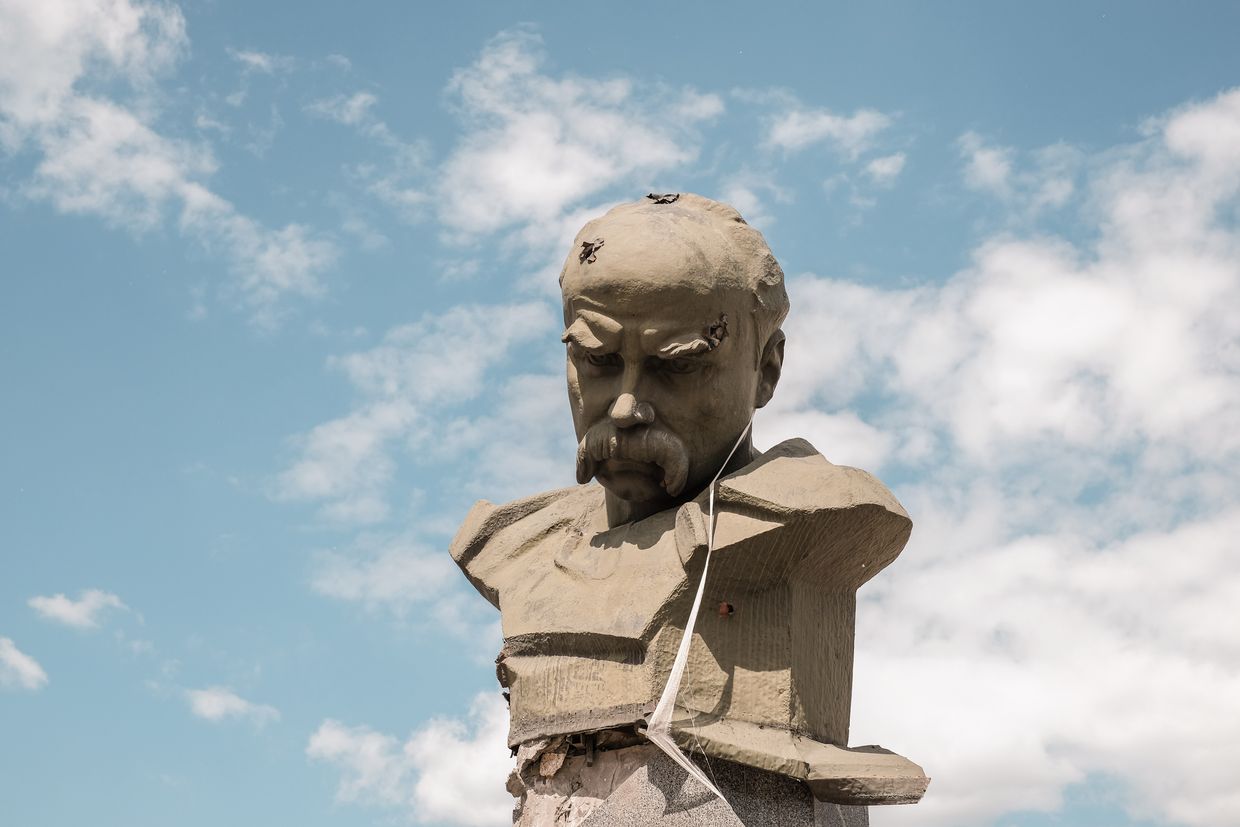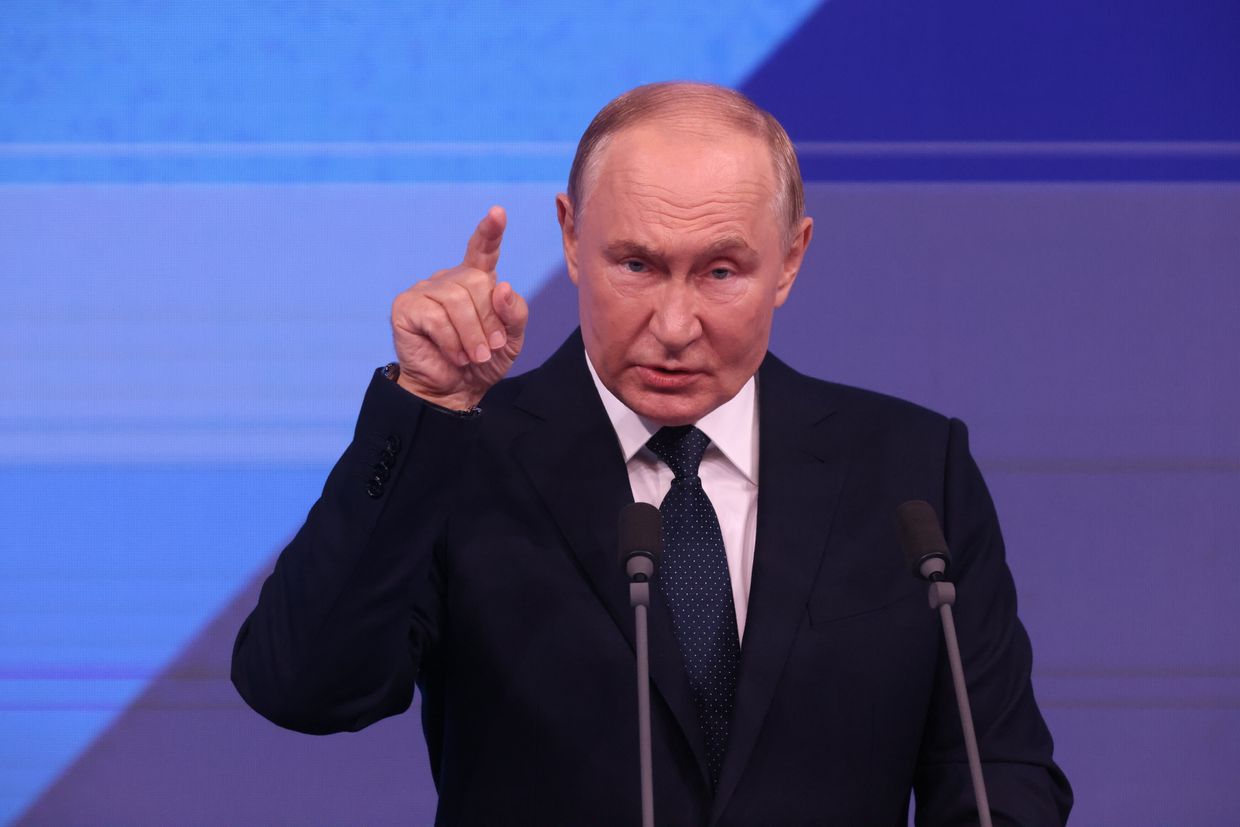Opinion: The West cannot use its values to make sense of Russia
The West's failure to deter Putin's military ambitions is a direct result of its persistent belief that a show of goodwill can disarm a leader who values strength above all.

Russian servicemen walk against the backdrop of the Red Square in Moscow, Russia, on Jan. 19, 2024. (Alexander Nemenov/AFP via Getty Images)

Julian McBride
Journalist
During the last decade, Western governments, analysts, and media personalities have struggled to understand Russia’s actions and renewed imperial aggression in Ukraine – especially as the invasion has turned into a quagmire that the Kremlin appears unable to escape.
Since 2022, one-third of Russia’s prized Black Sea Fleet has been incapacitated, over 3,000 tanks lost, and casualties have reached levels not seen since World War II. Yet, there has been no major anti-war uprising in Russia like those seen during the Soviet-Afghan War, nor significant pushback against the ruling elite, save from a one-day mutiny by the Wagner mercenary group.
The fundamental error is that we apply our own standards to analyze Moscow’s actions. Because of this, the war continues, as the Russian government and society operate under different expectations.
Vladimir Putin, now poised to have ruled Russia for three decades after his recent election victory, was initially seen as a reformer compared to former Russian President Boris Yeltsin. Instead, he has exacerbated rhetoric on Russian imperial irredentism, particularly regarding Ukraine.
Putin’s hasty decision to ignite an all-out war on Ukraine in 2022, after consolidating control over Crimea and much of Ukraine’s Donbas region in 2014, puzzled many in the West. But trying to rationalize Putin’s actions has played into his hands.
"Trying to rationalize Putin’s actions has played into his hands."
A career KGB officer who served in East Germany, Putin witnessed the fall of the Berlin Wall and the Soviet Union, events he sees as tragedies that diminished Russian power. His career as a high-ranking intelligence officer taught him to call bluff and escalate at signs of weakness.
From the West’s limited response to chemical attacks in Syria to the lack of aid to Ukraine before 2022, Putin has escalated whenever he perceived weakness. Conversely, he has shown to de-escalate when confronted with strength, such as after Turkey downed a Russian Sukhoi Su-24 aircraft or the U.S. response during the Battle of Khasham.
World leaders must understand that trying to make sense of a man who models himself after Joseph Stalin is futile. What Putin respects is strength, and for now, his bluffs must be called, or further escalation is likely.
Against the backdrop of the full-scale invasion of Ukraine, Russia’s force projection and military capabilities have taken a heavy toll on the nation. Currently, it would take Russia a decade to rebuild its military back to pre-2022 strength, and any other modern military would have withdrawn or frozen a conflict over such losses. However, Russia continues to press on.
Since the fall of the Soviet Union, Russia’s defense industry has been plagued by embezzlement, fraud, and money laundering, which explains the heavy equipment losses.
While the Su-57 and the T-14 Armata were promised to rival America’s best equipment, neither the fifth-generation aircraft nor the premier Russian tank has made its way to Ukraine due to costs and major flaws the Kremlin refuses to address. Despite inheriting a massive Soviet stockpile, if Moscow continues the war, it risks depleting the majority of these resources. At the current pace, Russia’s T-90, T-80, and T-72 tank fleet could be non-functional by 2026, with little remaining.

Russian generals and parliament members overseeing military progress have pocketed funds that Putin overlooked, and instead of making improvements, Russian service members suffer from a lack of equipment care, leading to heavy military casualties.
The Russian invasion of Ukraine is not only the deadliest conflict since the Iran-Iraq War in the 1980s but also the largest mass-casualty war for the Russian military since World War II. Estimates range from 500,000 to 700,000 casualties, with an uptick in killed and wounded during the late spring as Russia intensified its offensive actions in Kharkiv and Donetsk.
Russia’s mass casualties exemplify the country’s lack of goals achieved in the war thus far, as Russia does not fully control any of the Ukrainian oblasts it wants to annex (Luhansk, Donetsk, Zaporizhzhia, and Kherson).
The Kremlin has also failed in its attempts at regime change in Kyiv and landlocking Ukraine, but nevertheless, the war has not produced a major anti-war movement in Russia, nor a mass mutiny akin to the uprisings of 1917.
One major reason for the absence of significant internal military or civilian uprisings is the system Putin has established and the historical context of irredentism in relation to military casualties. Putin has set up a strict hierarchy that places his intelligence apparatus, the FSB, above the military to clamp down on unmotivated generals. Historically, Russia is willing to accept mass casualties to achieve its goals.
World Wars I and II saw Russia willing to endure millions of casualties to achieve objectives, and in Ukraine, this is no exception. Lacking Non-Commissioned Officers (NCOs), the Kremlin maintains a system where lower enlisted personnel will always obey orders – regardless of how unlawful or inept they may be, such as the continuous human wave assaults that Russia employs in Ukraine.
After the Wagner Group’s brief mutiny and the decapitation of their leadership, there is now little resistance or pushback against Putin’s brutal rule. The West should not expect any opposition or potential coup to emerge during the war. Instead, the West should continue providing substantial military aid to Ukraine and training Kyiv's new forces after the mobilization, as the best way to apply pressure on Russia’s ruling elite is through the destruction of their pride – the military.
Ultimately, Russia has managed to escalate not only in Ukraine but also in Georgia and Syria by blackmailing the world with nuclear weapons. This policy was exacerbated after the decimation of the Wagner Group during the Battle of Khasham against U.S. forces.
Nevertheless, Ukraine has demonstrated that Russia’s “red lines” concerning potential nuclear weapon use aren’t worth the paper they’re written on. Ukraine successfully liberated territory in Kherson that Russia claims as its own, forced the Black Sea Fleet to withdraw, and launched incursions into Kursk – yet Russia did not respond with nuclear weapons.
Western politicians and analysts need to remember that Putin and Russia will always respond to weakness and escalate at the sight of fear. The only way to maintain peace is to respond firmly and prepare for any scenario, including war.
Editor’s Note: The opinions expressed in the op-ed section are those of the authors and do not purport to reflect the views of the Kyiv Independent.












